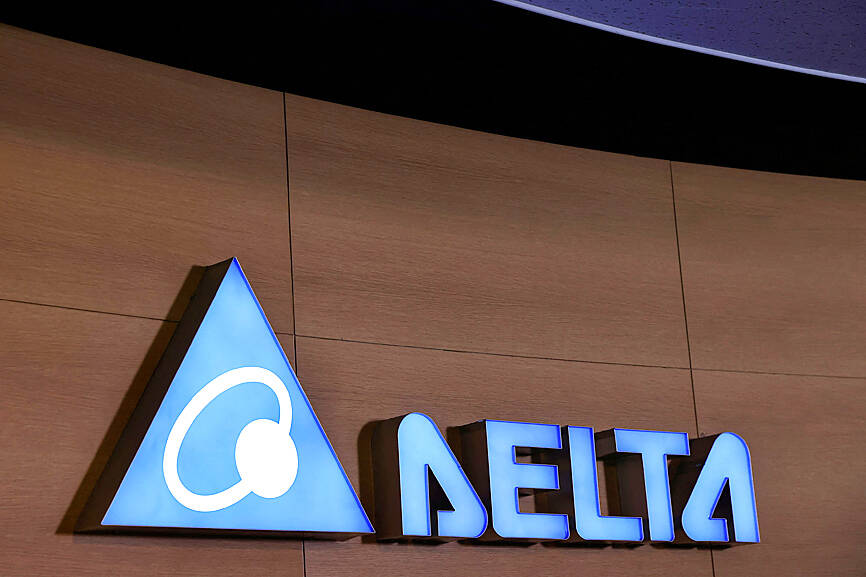Infineon Technologies AG yesterday signed a memorandum of understanding with Delta Electronics Inc (台達電) to extend their partnership to automotive applications by providing more efficient and higher-density solutions for electric vehicles (EVs).
Delta, based in Taipei’s Neihu District (內湖), has been collaborating with Infineon in industrial products for the past 25 years.
The new cooperation covers a wide range of components such as microcontrollers, and high and low-voltage modules, the companies said in a statement.

Photo: Ann Wang, Reuters
The components are to be used in EV drivetrain applications such as traction inverters, DC-DC converters and onboard chargers, the statement said.
In addition, both parties agreed to create a joint innovation lab to be named the Delta-Infineon Automotive Innovation Center in Taoyuan’s Pingzhen District (平鎮) in the second half of this year. The center would be managed by both companies.
“We want to further advance the energy efficiency of electromobility together by combining Infineon’s comprehensive automotive product portfolio and application know-how with Delta’s expertise in integration and system optimization,” Peter Schiefer, president of Infineon’s Automotive division, said in the statement.
“Ensuring the energy efficiency of automotive applications is of paramount importance in our time and we are committed to further improving it,” Schiefer said.
“We are now looking forward to extending this partnership to electromobility,” Delta vice president James Tang (唐修平) said. “We see growing demand in the automotive industry for innovative, clean and energy-efficient solutions. Together with Infineon, we are committed to support the global transition to electromobility with our products and solutions, and to bring electromobility to a whole new level.”
Delta last month told investors it expected strong growth momentum in its EV component business this year and forecast that its EV business would turn a profit for the first time this year, 15 years after it tapped into the market.
Delta counts major automakers from the US, Europe and Japan among its customers, including Ford Motor Co.
The company is aiming to seize 15 percent of the global market for EV-related components and piles by 2030, compared with about 8 percent last year, Delta founder Bruce Cheng (鄭崇華) said in November last year.

CAUTIOUS RECOVERY: While the manufacturing sector returned to growth amid the US-China trade truce, firms remain wary as uncertainty clouds the outlook, the CIER said The local manufacturing sector returned to expansion last month, as the official purchasing managers’ index (PMI) rose 2.1 points to 51.0, driven by a temporary easing in US-China trade tensions, the Chung-Hua Institution for Economic Research (CIER, 中華經濟研究院) said yesterday. The PMI gauges the health of the manufacturing industry, with readings above 50 indicating expansion and those below 50 signaling contraction. “Firms are not as pessimistic as they were in April, but they remain far from optimistic,” CIER president Lien Hsien-ming (連賢明) said at a news conference. The full impact of US tariff decisions is unlikely to become clear until later this month

With an approval rating of just two percent, Peruvian President Dina Boluarte might be the world’s most unpopular leader, according to pollsters. Protests greeted her rise to power 29 months ago, and have marked her entire term — joined by assorted scandals, investigations, controversies and a surge in gang violence. The 63-year-old is the target of a dozen probes, including for her alleged failure to declare gifts of luxury jewels and watches, a scandal inevitably dubbed “Rolexgate.” She is also under the microscope for a two-week undeclared absence for nose surgery — which she insists was medical, not cosmetic — and is

GROWING CONCERN: Some senior Trump administration officials opposed the UAE expansion over fears that another TSMC project could jeopardize its US investment Taiwan Semiconductor Manufacturing Co (TSMC, 台積電) is evaluating building an advanced production facility in the United Arab Emirates (UAE) and has discussed the possibility with officials in US President Donald Trump’s administration, people familiar with the matter said, in a potentially major bet on the Middle East that would only come to fruition with Washington’s approval. The company has had multiple meetings in the past few months with US Special Envoy to the Middle East Steve Witkoff and officials from MGX, an influential investment vehicle overseen by the UAE president’s brother, the people said. The conversations are a continuation of talks that

CHIP DUTIES: TSMC said it voiced its concerns to Washington about tariffs, telling the US commerce department that it wants ‘fair treatment’ to protect its competitiveness Taiwan Semiconductor Manufacturing Co (TSMC, 台積電) yesterday reiterated robust business prospects for this year as strong artificial intelligence (AI) chip demand from Nvidia Corp and other customers would absorb the impacts of US tariffs. “The impact of tariffs would be indirect, as the custom tax is the importers’ responsibility, not the exporters,” TSMC chairman and chief executive officer C.C. Wei (魏哲家) said at the chipmaker’s annual shareholders’ meeting in Hsinchu City. TSMC’s business could be affected if people become reluctant to buy electronics due to inflated prices, Wei said. In addition, the chipmaker has voiced its concern to the US Department of Commerce